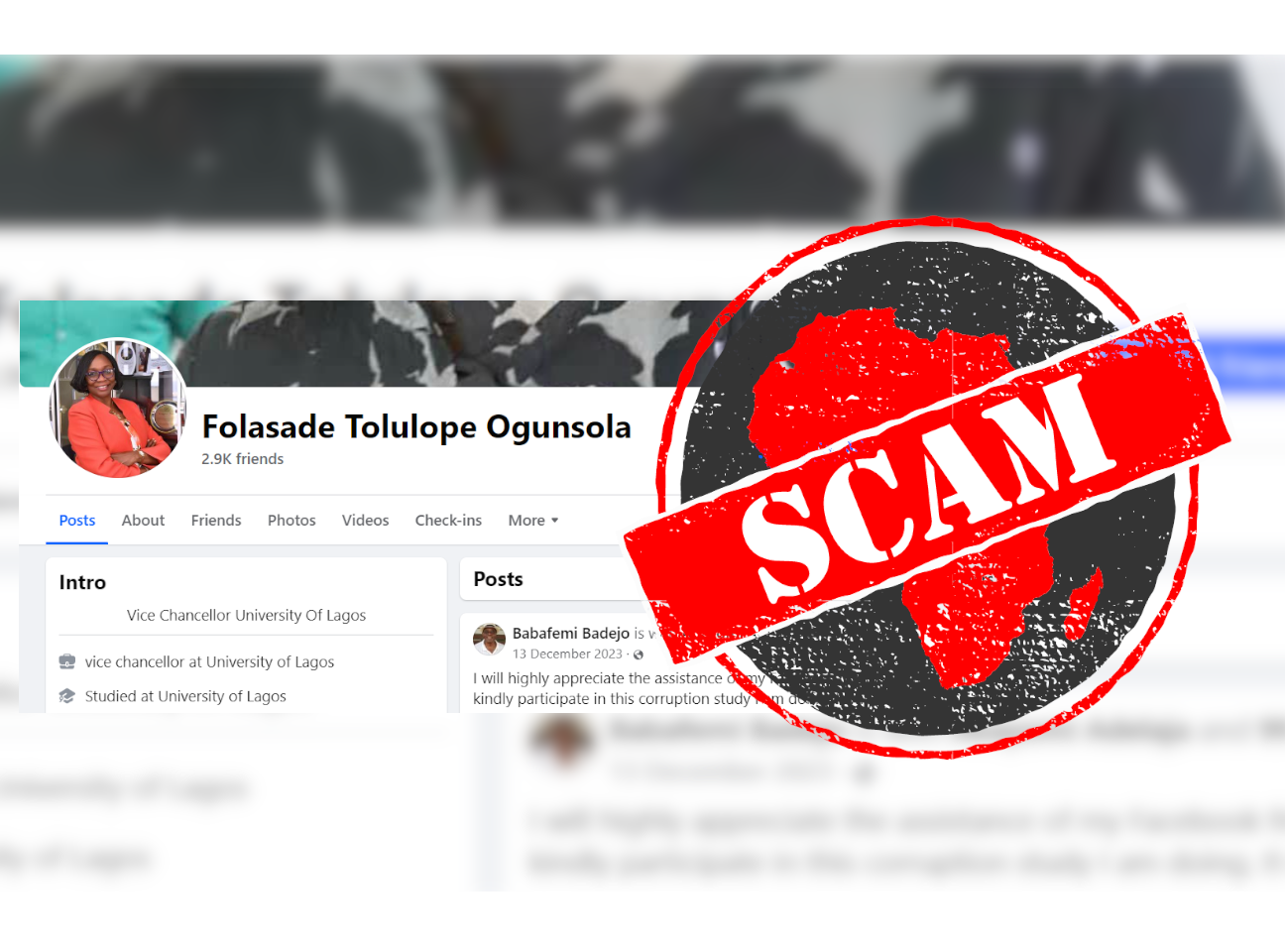IN SHORT: Folasade Ogunsola's role as head of one of Nigeria's leading academic institutions makes her a target for scammers. Social media users are advised to steer clear of accounts impersonating her.
At least five Facebook accounts claim to belong to the vice-chancellor of the University of Lagos, Folasade Ogunsola, who is also a professor of medical microbiology.
But only one is real, Ogunsola told Africa Check.
Ogunsola is widely respected as the first first female vice-chancellor of the university in Nigeria’s largest city. She is also recognised for being the first female provost of the university's College of Medicine.
According to Nigeria's National Universities Commission, a vice-chancellor is the chief executive of a university, responsible for running the institution and overseeing its assets, among other key roles.
This may explain why Ogunsola has been targeted by fraudsters.
After receiving reports of unusual activity from Facebook accounts in her name, Ogunsola asked Africa Check to investigate. (Disclosure: Africa Check is hosted by the University of Lagos.)
One of the fake accounts has more than 2,900 friends. The account's URL shows that it was first registered as Onyenanchi Nweke. A URL, or uniform resource locator, is the address used to access a specific resource on the internet, such as a web page.
Another Facebook account, also claiming to be Ogunsola, has over 1,100 friends.
Both accounts have more friends than the real but unverified account of the vice chancellor, where she has 829 friends. The suspicious accounts have also not posted any significant updates about Ogunsola, apart from a few of her publicly available photos.
‘Imposters appear to be unrelenting’
We found two other accounts impersonating the vice-chancellor, here and here.

The fake accounts have Ogunsola's name and title as vice-chancellor of the University of Lagos spelt out in full. But her real account, she told Africa Check, is called Sade Ogunsola and simply identifies her as a professor at the university.
Her authentic account shows that she joined Facebook in October 2010. None of the fake accounts posted before 2019.
Ogunsola told Africa Check that she was aware of the fake accounts and that they might have been used to defraud people, but she had been unable to have them taken down.
“Those accounts are not mine, they are all fake, except for the one that I have identified to you. When I noticed that my account was being impersonated, I put out disclaimers on the Unilag website and social media platforms in January 2023 to alert the unsuspecting public to the existence of these fake accounts.
“But the impersonators appear to be unrelenting as new fake accounts spring up every so often. In fact, a new one was created a few days ago,” she said.
Fake accounts being used to scam
We found evidence that at least one of the fake accounts is being used to try to scam people.
Ngozi Okafor, an associate professor in the department of science education at the University of Lagos, said she accepted a friend request from a Facebook account she believed was Ogunsola’s.
But she became uncomfortable when the account offered her 10 slots for jobs at the university in exchange for N3 million (about US$3,100 at current exchange rates).
Okafor said she challenged the impersonator, saying: “The VC has a lot of integrity and cannot belittle herself by asking for N300,000 to give a job slot to an applicant. The statements you are making cannot be hers. Please stop this communication or you will bear the legal consequences.”
And in January 2024 a representative of a university in the UK sent an email, which Africa Check has seen, to Ogunsola to follow up on an alleged conversation about collaboration between the two institutions.
The vice-chancellor has said she had not initiated a conversation with the British university.
We have uncovered several Facebook scams, including instances where well-known organisations and individuals are impersonated, like this one.
To avoid falling for such scams, read our guide to spot and avoid them.
Republish our content for free
For publishers: what to do if your post is rated false
A fact-checker has rated your Facebook or Instagram post as “false”, “altered”, “partly false” or “missing context”. This could have serious consequences. What do you do?
Click on our guide for the steps you should follow.
Publishers guideAfrica Check teams up with Facebook
Africa Check is a partner in Meta's third-party fact-checking programme to help stop the spread of false information on social media.
The content we rate as “false” will be downgraded on Facebook and Instagram. This means fewer people will see it.
You can also help identify false information on Facebook. This guide explains how.




Add new comment